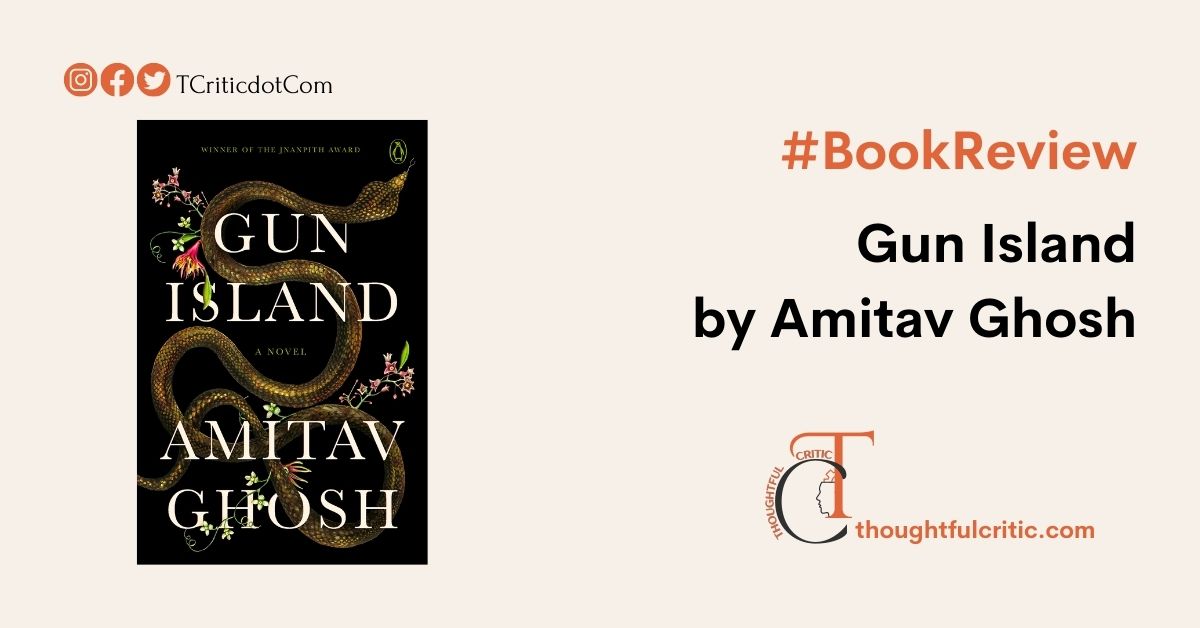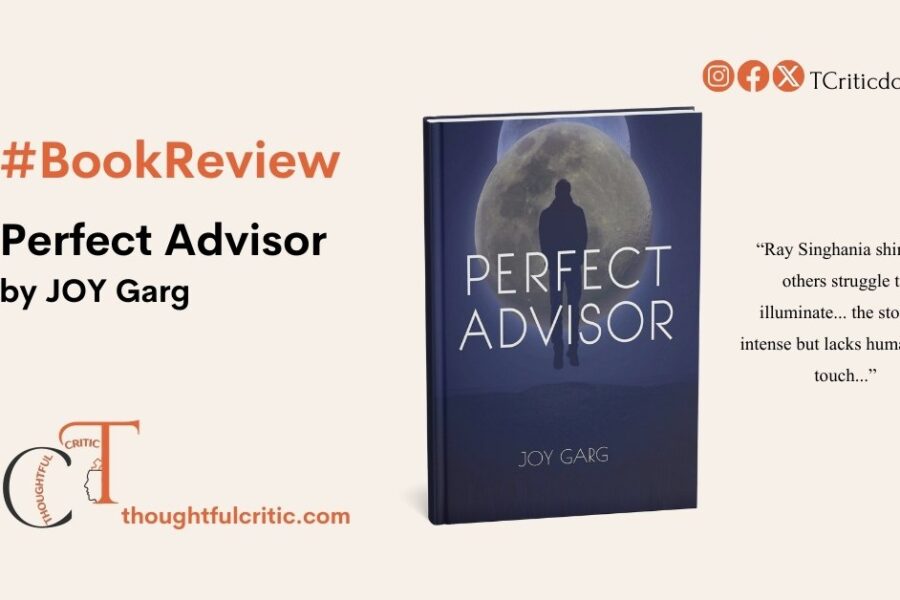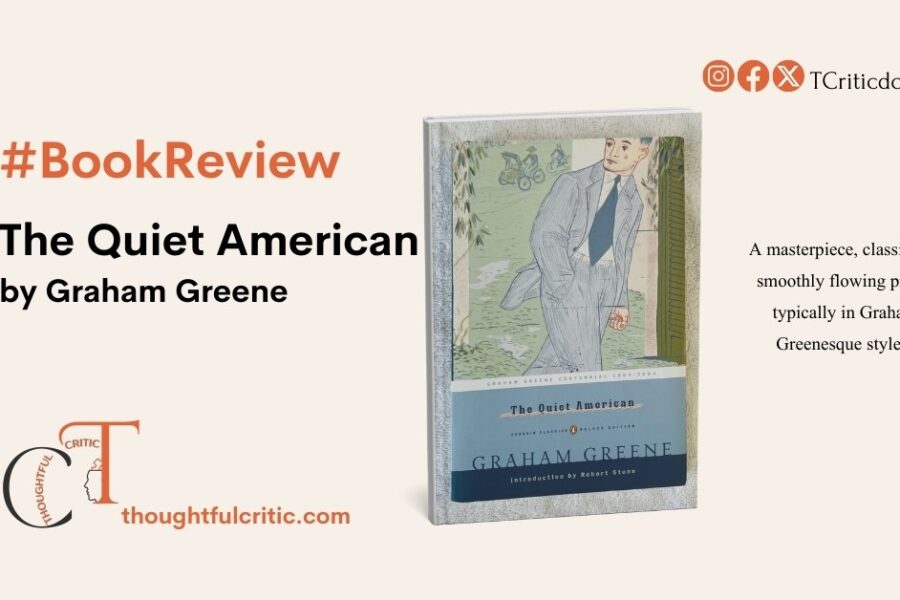Amitav Ghosh is one of the leading Indian English novelists and a prominent figure in Indian English literature. Whether he lives in India or not is not up for debate, at least this time. 🙂 I will be discussing his novel Gun Island in this article, which is also a book review. I will try to bring the highlights of the significant features of the novel along with the limitations that I noticed. Among novelists who are actively producing literary works now in India, I find Amitav Ghosh the most balanced and also respected literary figure because he does not compromise either on literary merit or the themes and subjects. Let us begin with the story of The Gun Island in a nutshell. It will give any reader a base to begin with so that the discussions later will resonate. Want to know about the author? Read this biography with many details and analysis: Amitav Ghosh
The Story in a Nutshell:
Gun Island by Amitav Ghosh is a broad narrative that follows the journey of Deen Dutt, an antiquarian, as he embarks on a quest that takes him from Kolkata to the Sundarbans and beyond. Intrigued by an ancient legend of the Gun Merchant, Deen finds himself entangled in a web of personal and global histories, environmental concerns, and mythological connections. Well, you are reading Ghosh and you will land in Kolkata, somehow. Also, you will certainly find some connections that lure you into the depths of environmental issues, a messy web of histories from different points of view and many other pulls – the author offers more than a simple story. Along the way, the protagonist encounters characters who challenge his perceptions. Deen, the protagonist, also confronts the impacts of climate change. As he navigates through the complexities of love, loss, and human resilience, Deen unravels the interconnectedness of human lives, the natural world, and the forces that shape our shared destiny. The novel is divided into two parts – The Gun Merchant and Venice. The chapters are rather cryptically named. And we also meet a familiar character, Kanai Dutt, who happens to be a distant relative of the protagonist, Deen Dutt. Kanai, if you remember, features in The Hungry Tide by Amitav Ghosh.
Critical Aspects – the Highs and the Lows:
Though a classic Amitav Ghosh novel promises many things, you will always find certain features that stand out to give you an immersive reading experience. And among many, one significant feature of the novel Gun Island is Ghosh’s careful and crafty incorporation of history. Through his extensive research and nuanced storytelling, he breathes life into past events, intertwining them with the present. For instance, the exploration of the devastating effects of the 2004 Indian Ocean tsunami serves as a poignant reminder of the interconnectedness of human lives and the impact of natural disasters (Ghosh, 2019, p. 103). It is like reliving the horrors of the event in a textually animated scenario. Beyond descriptions, Ghosh’s historical context not only adds depth to the narrative but also prompts readers to reflect on the reverberations of history in shaping our present realities. This is something I liked a lot. And features like this distinguish a classic Amitav Ghosh from many other contemporaries like Arundhati Roy and Kiran Desai.
I also noticed Ghosh skillfully blending folklore and mythology into the fabric of “Gun Island”. It was a good experience. Ghosh has dealt with the legend of the Gun Merchant, with its elements of magic and destiny, in such a way that it acts as a symbolic undercurrent throughout the novel. And also, by doing so, the novelist has been successful in mirroring the interconnectedness of human lives and the natural world. This amazing fusion of folklore and contemporary themes creates a sense of enchantment, allowing readers to delve into a realm where the boundaries between the real and the mythical blur. I seldom find other contemporary English novelists in India who could have achieved the same effect. Ghosh gets another upvote!
Another noteworthy feature, a trademark one, is Ghosh’s exploration of the human-nature relationship and the urgent issue of climate change. Through vivid descriptions of landscapes and ecosystems, Ghosh portrays the beauty and vulnerability of the natural world. The Sundarbans, with its mangrove forests and endangered wildlife, becomes a character in its own right, eliciting a sense of wonder and emphasising the importance of preserving our ecological heritage (Ghosh, 2019, p. 81). And that part is amazing… it adds a new dimension to the already layered nature of the narrative. Ghosh’s masterful portrayal of the environment reminds readers of their responsibility towards the planet and highlights the delicate balance between human actions and the earth’s well-being. And I called it a trademark feature because it is so. Read any novel by Ghosh and you will find he always finds the space to propagate about nature and our responsibility towards her.
Lastly, needless to say, the language that Ghosh chooses (not language per se) is amazing. As often, Ghosh’s prose exhibits a lyrical quality that enhances the novel’s literary appeal. His vivid and evocative descriptions create sensory experiences that transport readers to the bustling streets of Kolkata or the mysterious depths of the mangrove forests. Through his eloquent language, Ghosh captures the nuances of emotions, sights, and sounds, allowing readers to immerse themselves in the rich tapestry of the narrative. Throughout the novel, you will find language at its best. Nevertheless, despite being descriptive and dragged at times, readers seldom get enough of it. The setting, the narrative and the storyline, it seems, demand such lyrical and loaded language.
The limitations, shortcomings & lapses in the novel Gun Island:
No work of literature is free of shortcomings. And Gun Island by Ghosh is no exception! And that one can see in this novel – as you go on reading the work, you will find that various narratives that come together do create an amazing experience but at the cost of reader engagement, at times. Readers may feel overloaded, not by the language but by the storylines that come from various directions. It seems, at times, that the author has tried to tell too much in a single tale. For instance, the prolonged exploration of the protagonist’s personal history and relationships diverts attention from the central themes – call it environmental concerns or the explorations in the direction of Bandook Sadagar. And it results at times in a disjointed reading experience.
Likewise, as you read the novel, you may also feel that the plot isn’t uniformly able to hold everything together in the novel. While the novel begins with an intriguing premise — an antiquarian discovering an ancient legend — this central plotline, as we read on, becomes overshadowed by secondary narratives and historical asides. Though those details might be interesting on many occasions, readers will look for the lost storyline. It is no secret that the multitude of subplots can be overwhelming and result in a lack of narrative cohesion. Consequently, the overarching story arc loses momentum, and readers may find themselves searching for a stronger sense of direction and resolution (which seldom arrives).
Ghosh’s characterisation in Gun Island is not as well-developed as in his previous works. Many critics have mentioned this fact as well. However, I don’t agree with this opinion, largely. I find Deen Dutta an interesting character. Yes, there is no space for supporting characters and we find them underdeveloped and less rubbed, as expected. They come and go, as they are meant to do. However, some readers might find their roles rather limited and, perhaps, less than what they might have expected. It may be a subjective exploration for readers. Nevertheless, when compared to The Hungry Tide, the characters in this novel do lack depth. That might be a reason some readers may have expected more from Ghosh’s characters in this novel as well.
Technicalities, Judgement and Closure:
Well, no novel by Ghosh can be passed. You will need to read his works… he has that reputation. You may, though, find them immersive or not, but they are worth your time. And Gun Island stands tall! Despite its shortcomings, Gun Island exhibits several noteworthy features and promises a good story. Ghosh’s meticulous research and incorporation of historical events add depth and context to the narrative. Though, at times, the digressions or rather the main concerns in the novel, climate and environment concerns take the driving seat and readers may like that as well. It novel provides insightful commentary on climate change, migration, and the impact of human activities on the environment. Add that to the myth and folklore of the Gun Merchant, and the novel becomes unbeatable. Though its length may become unbearable at times, when you are suppressed by those interludes where things seldom happen and details are bombarded, leaving the story somewhere wrapped in smoke and shadows. Overall, with rich language, an interesting story, and a promising work of literature, Gun Island is a must-read!
Conclusion:
What is more to see? I have marked the novel as a must-read! However, just to maintain the decorum and continue the ritual of adding conclusions to book reviews, let us admit that Gun Island by Amitav Ghosh presents a complex and multilayered narrative, tackling themes of climate change, history, and human connection successfully. The novel is not only a new chapter in the legacy of Amitav Ghosh as a major literary figure of the 21st century, but it also adds a new chapter to the corpus of Indian English literature. Though it might lose coherence and unity at times, the author has this to compensate for that and the narrative goes on. Unlike Arundhati Roy and Kiran Desai, Amitav knows how to keep his readers engaged in the flow of the storyline. So, without giving it another jolt, just coax your mind to pick up a copy of your choice – hard cover, soft cover or a Kindle. Read this novel and you will have a few good days reading meaningful, sensible, and actually entertaining literature. Get your copy from Amazon India by following the link below:
Get a copy of this novel – click here to buy from Amazon India.
Review by Ashish for Thoughtful Critic
Gun Island by Amitav Ghosh – Book Review
-
ThoughtfulCritic's Rating
Summary
At times, the central motif might take the backseat and digressions overshadow it. However, the merits of Ghosh’s storytelling and lucidly flowing language never let readers lose interest in reading. A quality work of fiction with many real concerns! Enjoy reading!





Very innovative style of writing… love the way you have encouraged readers to carry on reading… and the literary analysis if Gun Island by Amitav Ghosh is amazing and worth reading for anyone who loves reading novels. Keep up the good work on this platform!